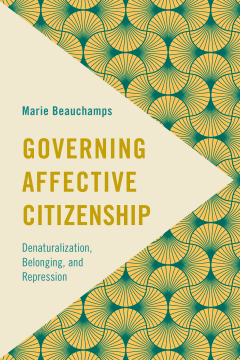
Additional Information
Book Details
Abstract
This book investigates politics of denaturalisation as a system of thought that influences seminal cultural political values, such as community, nationality, citizenship, selfhood and otherness. The context of the analysis is the politics of citizenship and nationality in France. Combining research insights from history, legal studies, security studies, and border studies, the book demonstrates that the language of denaturalisation shapes national identity as a form of formal legal attachment but also, and more counter-intuitively, as a mode of emotional belonging. As such, denaturalisation operates as an instrumental frame to maintain and secure the national community.
Going back to eighteenth-century France and to both World Wars, periods during which governments deployed denaturalisation as a technology against “threatening” subjects, the analysis exposes how the language of denaturalisation interweaves concerns about immigration and national security. It is this historical backdrop that helps understand the political impact of denaturalisation in contemporary counterterrorism politics, and what is at stake when borders and identities become affective technologies.
Marie Beauchamps has written a most timely book on denaturalisation. Using a set of cases spread throughout French history, she highlights both the recurrence of state actors making citizens foreign and the political and identitarian stakes involved. It is a frightening genealogy showing that citizenship is never to be taken for granted and is easily considered to be a privilege rather than a right by those with governmental power. Her book also makes a major contribution to security studies through its conceptually innovative analysis of how emotional economies of insecurity play out in political situations. It makes a great case for the importance of the archival study of citizenship practices and the political enactment of emotions to understand key aspects of the contemporary politics of insecurity.
Jef Huysmans, Professor of International Politics, Queen Mary, University of London
Marie Beauchamps is a guest researcher at the Amsterdam School for Cultural Analysis (ASCA), University of Amsterdam.
Table of Contents
| Section Title | Page | Action | Price |
|---|---|---|---|
| Cover | Cover | ||
| Half Title | i | ||
| Series Information | ii | ||
| Title Page | iii | ||
| Copyright Page | iv | ||
| Contents | v | ||
| Acknowledgments | vii | ||
| Introduction | xi | ||
| Part I TheForeigner of the French Revolution | 1 | ||
| 1 The French Revolution: A Producer of Narratives about Citizenship | 3 | ||
| 2 Becoming Foreign 1: The Nation as Space Susceptible to Intrusion | 11 | ||
| 3 Becoming Foreign 2: The Nation and Its Affective Economies | 23 | ||
| 4 Becoming Foreign 3: The Nation and Its Juridical Community | 35 | ||
| PART II Denaturalization in Times of War: Modeling the Self, Creating the Other | 55 | ||
| 5 From Belonging to Repression: Denaturalization and World War I | 57 | ||
| 6 Denaturalization in the Context of World War II: Expanding Denaturalization before the War | 69 | ||
| 7 Denaturalization in the Context of World War II: France’s Totalitarian Infection | 81 | ||
| PART III Terrorism, Nationality, and Citizenship: \nFrance and Beyond | 97 | ||
| 8 Of the Link between the War against Terrorism and Denaturalization | 99 | ||
| 9 The Twenty-First-Century Struggles over Denaturalization | 119 | ||
| Conclusion | 133 | ||
| Bibliography | 137 | ||
| Index | 149 |
